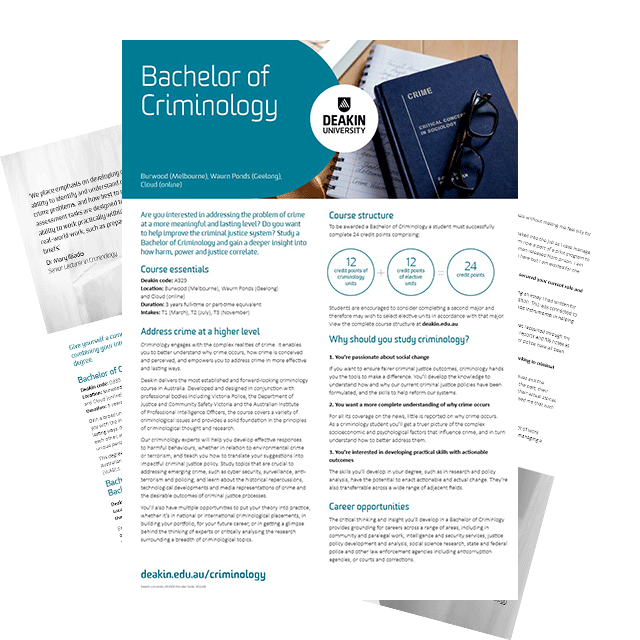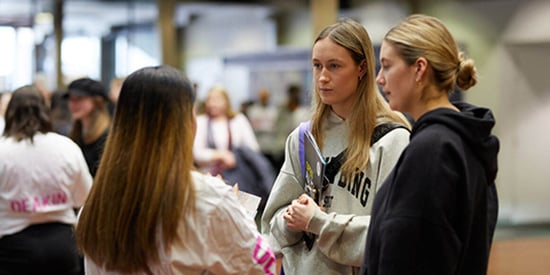Key facts
Key dates
Direct applications to Deakin for Trimester 2 2024 close 23 June 2024
Direct applications to Deakin for Trimester 3 2024 close 27 October 2024
Current Deakin Students
To access your official course details for the year you started your degree, please visit the handbook
Course overview
Deakin’s Bachelor of Criminology provides a comprehensive course of study in this growing academic field. Deakin has one of the few dedicated criminology courses in Australia, allowing us to offer a wide variety of criminology topics. The degree provides a solid educational foundation in the principles of criminological thoughts and research that will enable graduates to choose between seeking employment in related industries and seeking to undertake further study. Deakin’s criminology program involves broad fields of study with students covering a considerable breadth and depth of crime and criminal justice issues, as well as specialisation in areas such as victimology, media, terrorism, crime prevention, security and surveillance.
You will have the opportunity to complete the Criminology Practicum in your final year of study, a unit that brings the professions to the classroom (including online via the ‘cloud’) with practitioner-driven seminars, activities bridging theory and practice, and the development of an e-portfolio that can be used for employment or career development.
The course aims to produce graduates with the ability to engage in debates concerning crime and justice issues, matters that are part of everyday life, and practical knowledge and skills in an engaging field of study with diverse career prospects.
In line with Deakin’s commitment to providing flexible study options, you can choose to study the Bachelor of Criminology full time or part time. All subjects provide considerable online activities. You will also have the opportunity to significantly fast-track your studies, completing the Bachelor of Criminology in just two years by making the most of Deakin’s trimester system.
Read MoreCourse information
- Award granted
- Bachelor of Criminology
- Year
- 2017 course information
- VTAC code
- 1400311271 - Waurn Ponds (Geelong), Commonwealth Supported Place (HECS)
1400314631 - Waurn Ponds (Geelong), Commonwealth Supported Place (HECS)
1400514631 - Burwood (Melbourne), Commonwealth Supported Place (HECS)
1400614631 - Online, Commonwealth Supported Place (HECS)
9190110232 - Burwood (Melbourne), Commonwealth Supported Place (HECS) - Deakin code
- A329
- CRICOS code?
- 057849B Burwood (Melbourne), Waurn Ponds (Geelong)
- Level
- Undergraduate
- Approval status
- This course is approved by the University under the Higher Education Standards Framework.
- Australian Qualifications Framework (AQF) recognition
The award conferred upon completion is recognised in the Australian Qualifications Framework at Level 7.
Course structure
To qualify for the Bachelor of Criminology a student must complete 24 credit points of study including:
- at least 12 credit points of ACR coded units, including the compulsory core units of ACR101, ACR102, ACR201, ACR202, ACR301 and ACR302;
- up to 12 credit points can be non-ACR coded units;
- no more than 10 credit points at level 1 including ACR101 and ACR102;
- at least 14 credit points at level 2 or above including ACR201 and ACR202;
- at least 4 credit points at level 3 including ACR301 and ACR302;
- no more than 8 credit points taken outside the Faculty of Arts and Education.
Students are encouraged to consider completing a second major and therefore may wish to select elective units in accordance with that major. Please refer to A300 Bachelor of Arts for list of Faculty of Arts and Education major sequences.
12
Criminology units
12
Elective units
24
Total units
Students commencing from 2014
Level 1
Level 2 & 3
Plus at least six credit points from-
*ACR210, ACR211 - Trimester 1 (alternate years 2018, 2020) and trimester 3 (alternate years 2017, 2019)
**ACR212, ACR213 - Trimester 3 (alternate years 2018, 2020) and trimester 1 (alternate years 2017, 2019)
Students commencing prior to 2014
Continuing Criminology students who commenced prior to 2014 to contact Student Services Office for re-enrolment advice and to review Course Plans. From 2014, most Criminology ASL coded units have been replaced with Criminology ACR coded units.
Students applying with prior study or recognition for prior learning will need to contact the student services office to review their enrolment plans.
Intakes by location
The availability of a course varies across locations and intakes. This means that a course offered in Trimester 1 may not be offered in the same location for Trimester 2 or 3. Check each intake for up-to-date information on when and where you can commence your studies.
Trimester 1 - March
- Start date: March
- Available at:
- Burwood (Melbourne)
- Waurn Ponds (Geelong)
- Cloud Campus
Trimester 2 - July
- Start date: July
- Available at:
- Burwood (Melbourne)
- Waurn Ponds (Geelong)
- Cloud Campus
Trimester 3 - November
- Start date: November
- Available at:
- Burwood (Melbourne)
- Waurn Ponds (Geelong)
- Cloud Campus
Deakin splits the academic year into three terms, known as trimesters. Most students usually undertake two trimesters each year (March-June, July-November).
Additional course information
Transition to University study
The faculty offers two units AIX160 Introduction to University Study and AIX117 Professional Writing for Work which are specifically designed to ease the transition into university study. New students are encouraged to enrol in one of both or these units in their first year.
Assessment
Assessment within the award of Bachelor of Criminology varies from written assignments and/or examination to practical and technical exercises and performance. In some units assessment may also include class participation, online exercises, seminar exercises and tests.
Entry requirements
Recognition of prior learning
The University aims to provide students with as much credit as possible for approved prior study or informal learning which exceeds the normal entrance requirements for the course and is within the constraints of the course regulations. Students are required to complete a minimum of one-third of the course at Deakin University, or four credit points, whichever is the greater. In the case of certificates, including graduate certificates, a minimum of two credit points within the course must be completed at Deakin.
You can also refer to the Credit for Prior Learning System which outlines the credit that may be granted towards a Deakin University degree and how to apply for credit.
Fees and scholarships
Fee information
Learn more about fees.
The tuition fees you pay will depend on the units you choose to study as each unit has its own costs. The ‘Estimated tuition fee’ is provided as a guide only based on a typical enrolment of students undertaking the first year of this course. The cost will vary depending on the units you choose, your study load, the time it takes to complete your course and any approved Credit for Prior Learning you have.
Each unit you enrol in has a credit point value. The ‘Estimated tuition fee’ is calculated by adding together 8 credit points of a typical combination of units for that course. Eight credit points is used as it represents a typical full-time enrolment load for a year.
You can find the credit point value of each unit under the Unit Description by searching for the unit in the Handbook.
Learn more about fees and available payment options.
Scholarship options
A Deakin scholarship could help you pay for your course fees, living costs and study materials. If you've got something special to offer Deakin - or maybe you just need a bit of extra support - we've got a scholarship opportunity for you. Search or browse through our scholarships
Apply now
Applications for Trimester 1, 2025 open in August. Each year, thousands of students prepare for uni with the help of Deakin support services. We offer a huge range of support, including one-on-one consultations, webinars, online resources and events throughout the year.
Some of our courses have limited places available - for the latest on courses still open for application, visit Courses by trimester.
Create an account in the Deakin Application Portal, start your application, enter personal details, education experience, upload supporting documents and submit. Need help? Play this video, or contact one of our friendly future student advisers on 1800 693 888 or submit an online enquiry.
You can apply for this course through the Indigenous Access Scheme, which recognises the achievements of Aboriginal and Torres Strait Islander students and considers the skills, experience and community work that prepares you for study. We look beyond your ATAR and academic results so we can reward your hard work with a place at university.
Entry pathways
View pathways into the Bachelor of Criminology with our pathways finder.
Contact information
Arts and Education Student Services and Enrolment Enquiries
Waurn Ponds (Geelong)
Tel 03 5227 1359
artsed@deakin.edu.au
Burwood (Melbourne)
Tel 03 9246 8100
artsed@deakin.edu.au
Cloud (online)
Tel 03 5227 1359
artsed@deakin.edu.au
Careers
Want a degree that’s more than just a qualification? Our industry connections, world-class facilities and practical approach to learning are just some of the reasons why Deakin students graduate confident and ready to thrive in the jobs of tomorrow.
Career outcomes
As a graduate of this course, promising career opportunities await in both the public and private sector, state and federal police, intelligence agencies, and a range of law enforcement, anti-corruption and crime prevention agencies at federal, state and local government level, as well as in correctional services, community services and private security industries.
For more information go to DeakinTALENT
Course learning outcomes
Deakin's graduate learning outcomes describe the knowledge and capabilities graduates can demonstrate at the completion of their course. These outcomes mean that regardless of the Deakin course you undertake, you can rest assured your degree will teach you the skills and professional attributes that employers value. They'll set you up to learn and work effectively in the future.
| Deakin Graduate Learning Outcomes | Course Learning Outcomes |
| Discipline specific knowledge and capabilities | Review and analyse major social science theories and key criminological concepts, theories and technical knowledge relating to crime and criminal justice issues, including the causes and consequences of crime, ways of responding to crime, media representations of crime, core debates in policing, security and surveillance, as well as broader issues of policy and politics, inclusion and exclusion, governing and governance, security, social justice, citizenship and human rights. |
| Communication | Effectively communicate the findings and analyses of criminological concepts, theories and technical knowledge, in a selection of written, digital and oral formats, to a range of audiences. |
| Digital literacy | Employ a range of generic and specialist criminal justice-specific digital communication technologies to apply criminological knowledge and conduct social and criminological research and deliver reports and presentations to a diverse range of audiences within and outside the field. |
| Critical thinking | Analyse and critically evaluate theoretical approaches to crime problems and current policies and practices of governments and criminal justice practitioners and professions in the context of broad social change, new crimes, new responses and an increasing responsibility for preventing and controlling individual and complex crimes at local, state, national and international levels. |
| Problem solving | Employ initiative and creativity in conjunction with accepted evidence-based criminological methods to generate innovative and pragmatic approaches and solutions to complex problems in the areas of individual crime, complex and organised crime, the criminal justice process, questions of justice and injustice, local, national and international policing, surveillance, privacy and technology, and domestic and international crime and security issues. |
| Self-management | Demonstrate autonomy, responsibility, accountability and a continued commitment to learning and skill development, as a reflective practitioner, while working in the criminological field. |
| Teamwork | Work and learn collaboratively with others in the criminology field and from different disciplines and backgrounds while still maintaining responsibility for their own learning. |
| Global citizenship | Analyse and address criminological issues in the domestic and global context as a reflective scholar and practitioner, taking into consideration cultural and socio-economic diversity, social and environmental responsibility and the application of the highest ethical standards. |
| Approved by Faculty Board May 2014 | |
Events Explore more events
Footnotes
** Australian Graduate Survey 2010–2015, Graduate Outcomes Survey 2016–2020 (GOS), Quality Indicators for Learning and Teaching (QILT)
+Deakin references data from a range of government, higher education and reputable media sources. For more information, visit our list of media references.





